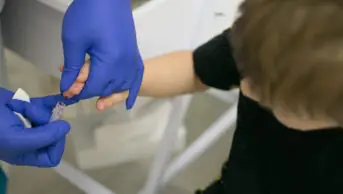
Mclean/Shutterstock.com
Diabetes medicines are complex and potentially scary for those who are not used to handling them. There are more than 30 different insulins — all with very similar sounding names — as well as an ever-expanding array of hypoglycaemic medicines.
“Anyone that’s not living and breathing diabetes will be out of date within about 18 months, it changes so fast,” says Philip Newland-Jones, consultant pharmacist for diabetes and endocrinology and clinical director of the diabetes and endocrine service at University Hospital Southampton NHS Foundation Trust. “You can’t just dabble and stay up to date.”
However, data obtained under the Freedom of Information (FOI) Act by The Pharmaceutical Journal have revealed that only one in three hospital trusts in England employs a specialist diabetes pharmacist (see Box 1), with less than one in eight having a full-time dedicated pharmacist in the role.
Out of 93 trusts that responded to the FOI request, which was sent to 130 trusts in February 2021, 31 said the role of specialist diabetes pharmacist existed, but only 11 had a dedicated full-time pharmacist in that role, with the rest splitting their time between several specialties.
This contrasts heavily with some other specialist pharmacy posts, such as antimicrobial pharmacists, which are present in most NHS trusts. This disparity can be seen at the senior level too, with only 3 approved consultant diabetes pharmacist posts in England and none in Scotland or Wales, compared with 13 approved consultant antimicrobial pharmacist posts in England, 4 in Wales and none in Scotland.
Box 1: How do you become a specialist diabetes pharmacist?
Specialist diabetes pharmacists provide leadership and training for junior pharmacists, doctors and nurses, support safe prescribing and medicines governance, review and develop treatment guidelines, participate in service improvement and cost-saving projects, in addition to providing a clinical pharmacy service.
There are no specific qualifications to become a specialist diabetes pharmacist. However, in May 2018, the UK Clinical Pharmacy Association published an integrated career and competency framework for pharmacists in diabetes. The framework describes the progression of knowledge and skills across competency levels and suggests how a pharmacist can build a career in diabetes care. It takes people from foundation stage all the way to becoming a diabetes consultant pharmacist.
Specialist pharmacist posts are usually advertised at a band 8a and require several years of post-registration experience and a clinical diploma, with an independent prescribing qualification desirable. There are also band 7 training posts in diabetes, where pharmacists are supported to build on their knowledge of diabetes management before progressing to a more senior role.
Consultant pharmacists are those who have been credentialed as such by the Royal Pharmaceutical Society and who have been appointed to an approved consultant post. They can demonstrate a high level of expertise in their area of practice and across what are known as the four pillars of practice — clinical, leadership, education and research.
High error rates
Patients with diabetes account for around one in every six hospital inpatients, but more than 90% are admitted for non-diabetes related reasons, meaning they are treated by staff who may not be experienced in diabetes care.
“One of the challenges is that we’ve made insulin so scary that, sometimes, junior doctors especially, feel that it’s better not to prescribe it because they don’t want to get it wrong,” says Hannah Syed, a specialist diabetes pharmacist who is employed by East Sussex Healthcare NHS Trust but works across primary and secondary care. “So that tends to lead to administration errors, whereby insulin is not prescribed, so people don’t get it on time.”
The 2019 National Diabetes Inpatient Audit, which included data from 188 hospital sites in England, revealed that almost one in three charts (30%) for diabetes inpatients had at least one medication error, such as a prescription error, glucose management error or insulin error. Data also showed that two-fifths of charts (18%) for insulin-treated inpatients had one or more insulin errors; for example, the wrong insulin being written up or insulin not being prescribed at all.
Insulin and diabetes medicines have one of the highest error rates of any medicine and the harm attached to the errors is also high
Philip Newland-Jones, consultant pharmacist for diabetes and endocrinology, University Hospital Southampton NHS Foundation Trust
The consequences of these errors can be serious. “Insulin and diabetes medicines have one of the highest error rates of any medicine and the harm attached to the errors is also high,” explains Newland-Jones.
Insulin errors can result in hypoglycaemic events and diabetic ketoacidosis (DKA), a serious condition that can lead to diabetic coma or even death. During the audit, 27% of inpatients with type 1 diabetes mellitus had experienced at least one severe hypoglycaemic episode in the past seven days, while 4% had developed DKA at some point during their hospital stay — making the risk of developing DKA in hospital between 40 and 60 times higher than the background incidence rate of the type 1 population.
Having a pharmacist as part of the inpatient diabetes team is crucial to reducing these errors, according to Partha Kar, clinical lead for diabetes at NHS England and consultant diabetologist at Portsmouth Hospitals NHS Trust, who co-led the diabetes ‘Getting it right first time’ (GIRFT) programme, a national programme funded by the Department of Health and Social Care that is designed to improve diabetes care within the NHS.
“We went round all the hospitals in the country and [found that] places that had inpatient pharmacists specifically for diabetes had less errors,” he says.
As a result, the GIRFT report, published in November 2020, recommended that all trusts should have a dedicated multidisciplinary diabetes inpatient team, including nurses, pharmacists, dietitians, psychologists, and podiatrists. So, what is stopping this from happening?
Barriers to implementation
One challenge hospitals face is a shortage of pharmacists. “Lots of pharmacists are now being pulled into primary care networks (PCNs), so there is a lack of trained people in pharmacy [to take on the role],” says Kar.
Another issue is difficulties around breaking into well-established teams. “When I started my role, it was a tricky relationship to manage as to what a pharmacist is going to be able to do as part of the diabetes specialist team, and not stepping on the work that the diabetes specialist nurses do,” says Syed.
Kar too acknowledges that people do not always think more widely than the conventional diabetes team. “Although there is a growing realisation that patient safety in insulin is very important, I don’t think it necessarily translates into people thinking beyond the traditional means, which is nurses and doctors.”
And, of course, with no specific national funding — unlike the £12m ploughed into antimicrobial pharmacists by the Department of Health back in 2003 as part of the Hospital Pharmacy Initiative — securing the finance for these posts is difficult.
Although the diabetes team and the pharmacy department supported me to do the role, we could not get the business case through
Vicky Ruszala, specialist pharmacist in cardiology and heart failure at North Bristol NHS Trust
Vicky Ruszala, who worked as a specialist diabetes pharmacist at North Bristol NHS Trust for many years, ultimately ended up moving to a specialist heart failure role because she was unable to get permanent funding for her diabetes post. “Although the diabetes team and the pharmacy department supported me to do the role, we could not get the business case through. There were always comparisons in the cost for a pharmacist versus the cost for a nurse, and there was little understanding of the difference between what [pharmacists and nurses] could offer.”
Newland-Jones acknowledges that most trusts have a small diabetes department compared with other specialties and says they often have to make tough choices about personnel. The national inpatient audit found that 18% of trusts do not have a specialist diabetes nurse. “If you only have a small budget, who would you recruit? Would you spend that money on a pharmacist, or would you invest in your first diabetes nurse for the trust?”
However, Kar says there is no reason why money from NHS England’s diabetes transformation fund — a £44m fund launched in 2017 to support improvement in the treatment and care of people with diabetes — cannot be spent on pharmacists. Almost £29m has already been invested in establishing new or expanded multidisciplinary footcare teams and diabetes inpatient specialist nursing teams. “We have never said that it should be only nurses,” says Kar.
Our question always is, ‘but what about pharmacists, have you looked at them?’
Partha Kar, clinical lead for diabetes at NHS England and consultant diabetologist at Portsmouth Hospitals NHS Trust
For those settings that have been unable to employ specialist nurses, “our question always is, ‘but what about pharmacists, have you looked at them?’ That money is still around, for people to consider using it accordingly”.
In fact, the diabetes transformation fund has enabled a new specialist diabetes pharmacist post to be created in Bath. The postholder, who will start in January 2022, will be hosted by the Royal United Hospitals Bath NHS Foundation Trust but will work across various sectors, including the PCN and clinical commissioning group (CCG).
“The CCG was very proactive and we have long had a pro-pharmacy consultant,” says Uzo Ibechukwu, chief pharmacist at the trust. “So once the money was identified, the big gap in the diabetes team was that we didn’t have a pharmacist.”
Added value
There are plenty of reasons why trusts should invest in pharmacists, who bring their own outlook to the role. “Pharmacists will really drive forward that medicines safety agenda, usually bringing along the pharmacy department with them,” says Newland-Jones, adding that, by employing that one person, the diabetes department will open the gates to the whole pharmacy department, which has a much wider impact.
“The more senior the person you put into that post, the more influence they have on all the juniors. So, straight away, the pharmacy staff are not only enabled and equipped, but also the expectation and the drive is there for them to have diabetes as one of their focus areas,” he explains.
As well as a medicines safety and leadership focus, diabetes pharmacists can help to build prescribers’ confidence in medicines choices. “The data that I’ve been presenting, as part of the work we’ve been doing, really demonstrate that we’ve got clinical inertia within our system,” says Syed. “So, by pharmacists being able to have more of that confidence around medication choices, we’re able to really work with our colleagues to be able to have more multidisciplinary team discussions and be able to select and empower others to be able to prescribe the right medication.”
Moving forward
Another way to get posts approved is to have them jointly funded between the pharmacy and diabetes departments, says Newland-Jones. This is how the pharmacy department at the Royal Wolverhampton NHS Trust managed to gain approval for the role of specialist pharmacist for diabetes and endocrinology, recruitment for which is currently open.
I had laid some groundwork by working with the diabetes team on service improvement projects
Daniel Peddie, divisional lead pharmacist, Royal Wolverhampton NHS Trust
Daniel Peddie, divisional lead pharmacist at the trust, explains that funding for the band 8a post is being shared between the endocrinology and pharmacy departments. Securing the funding came down to good timing, he explains. “I had laid some groundwork by working with the diabetes team on service improvement projects to improve the discharge flow. We’d also had a band 7 pharmacist covering the diabetes wards for a few months, and she made a good impression on the diabetes team.”
Funding for posts that are split between primary and secondary care may also be easier to come by because the potential cost impact of initiatives in both sectors is much larger. “The way we managed to get a consultant [pharmacist] post signed off in Leeds is to have it half funded by the hospital and half funded by the CCG,” says Newland-Jones. “With the formation of integrated care systems and integrated care providers, there is the opportunity to consider more centralised funding for consultant pharmacist posts in diabetes that could have an impact across a wider regional area,” he adds.
Funding aside, Syed believes that integrated roles such as hers at the East Sussex Healthcare NHS Trust are the way forward, particularly since most of the long-term management and prescribing for diabetes patients takes place in primary care. “I’ve really been able to take a leadership role and build those relationships between commissioners, primary care, secondary care and community care, and be able to bring everyone together so that we were able to map out what we wanted care to look like for our population in East Sussex,” she explains.
As we move towards an integrated care system, it needs to be less about ‘you are primary care and you are secondary care’
Hannah Syed, pan east sussex diabetes lead pharmacist, East Sussex Healthcare NHS Trust
“As we move towards an integrated care system, it needs to be less about ‘you are primary care and you are secondary care’.”
Ibechukwu agrees, saying that he only briefly considered basing the role at Bath solely in the acute trust. “We felt the cross-sector role would be the more attractive one and, given the recruitment crisis within hospitals, it would give the opportunity to pull pharmacists from many different sectors. And we did get really good candidates.” The role will be split, with three days in the PCN, one day with the CCG and one day in the acute trust.
Ibechukwu says he recognised the lack of specialist diabetes pharmacists when planning the new role and made sure education and training was an integral part of it. “The one part of this job which we’ve been quite explicit about is teaching. We want this to be either the first post of many or equip the wider workforce to do this type of work.”
Progress might be slow but it seems things are moving in the right direction, with several leaders in the field lighting the way (see Box 2). A Google search for specialist diabetes pharmacist posts by The Pharmaceutical Journal at the time of going to press revealed a handful of newly created roles, either solely based in acute trusts or split between primary and secondary care. And Newland-Jones says there is a diabetes consultant pharmacist post that is close to being signed off, and a couple more in the pipeline too.
And it is just as well. With the number of people living with diabetes in the UK predicted to hit 5.5 million by 2030, the need for specialist pharmacists will only become greater.
Box 2: Securing a post — words of wisdom
Philip Newland-Jones, consultant pharmacist for diabetes and endocrinology and clinical director of the diabetes and endocrine service, University Hospital Southampton NHS Foundation Trust:
“The first thing to do is go to speak to the diabetes service. Find out what their gaps and their needs are. Often the gaps and needs of the pharmacy department and the diabetes department align but you just haven’t had that conversation.
“Focusing on inpatient errors and inpatient length of stay, certainly for elective surgery, is by far the quickest and easiest way to make a cost-effective diabetes post in a hospital.”
Hannah Syed, pan East Sussex diabetes lead pharmacist, East Sussex Healthcare NHS Trust:
“If you have a well-resourced diabetes team within your trust, then maybe you might think about what primary care looks like. Is there clinical inertia? Have you got inappropriate prescribing?
“Don’t underestimate the absolute importance of data and building relationships and showcasing the work that you’ve done to be able to get more investment to do things.”
Partha Kar, consultant diabetologist, Portsmouth Hospitals NHS Trust and national specialty adviser (diabetes) at NHS England:
“There are a number of people I know who have done some absolutely brilliant stuff as pharmacists and in creating business cases. Look at the good examples, nick their business cases and use whatever you need to make your business case. NHS England would be more than happy to support the role of pharmacists in hospitals to improve safety.”
Uzo Ibechukwu, chief pharmacist, Royal United Hospital Bath NHS Foundation Trust:
“Know exactly how you’re going to demonstrate that return on investment before you even start the conversation.”


